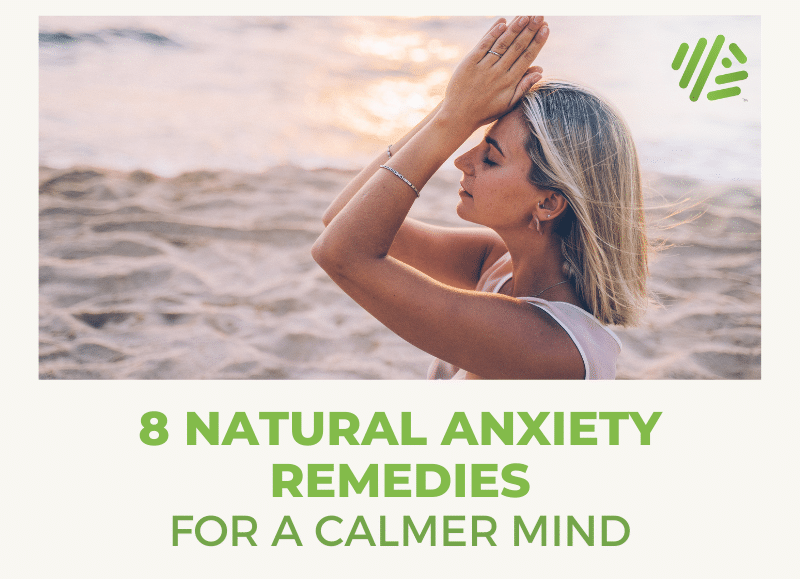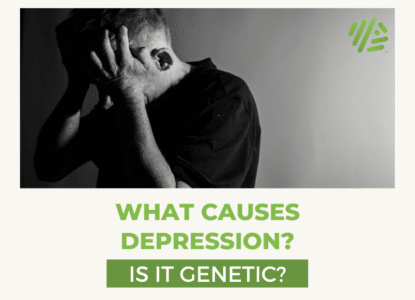8 Natural Anxiety Remedies for a Calmer Mind
Genes Mentioned

Contents
Anxiety is the most common mental health issue experienced by people in North America, with almost 1 in 5 American adults affected each year.1
That’s around 40 million people, all suffering with a highly treatable condition. Sadly, only 36.9% of those with anxiety receive treatment1, but the good news is that there are many natural remedies to help with anxiety.
For many people, anxiety is a result of specific circumstances, such as worries over money, housing, jobs, and relationships. John even wrote a post about how allergies can cause anxiety. A person’s propensity for anxiety is also influenced by genetics, brain chemistry, personality, and other factors. Happily, this means there is lots of scope for how to treat and prevent anxiety, with multiple possible biochemical and physiological targets.
The natural anxiety remedies listed below work in various ways to help calm down mind and body and are certainly worth trying if you’re struggling with anxiety.
See also: Serotonin boosting supplements: proceed with caution
#1. Omega-3 Fatty Acids
Most of us are not getting enough high quality omega-3 fatty acids in our diets, and this is a problem because our brains are made of the stuff.
In fact, there are a number of studies linking depression, anxiety, and in rare cases, even mental illness with deficient levels of omega-3 fats.23 We’ve written about the murky waters of fish oil supplements before, so if you venture down this path, be sure to choose a trustworthy brand.
For those of us that are Vegan, we need to convert alpha linoleic acid, which is a plant based form of omega-3, into the EPA and DHA the brain can use, and in some people with variants in the FADS1 genes, the conversion rate can be very low, so algal oil is a good option for a plant based product that has actual bioavailable EPA and DHA your brain can use.
#2. Rhodiola rosea
Rhodiola rosea (or roseroot) is an adaptogenic herb that helps improve our resilience to stress and helps calm anxiety while promoting mental and physical energy. I’ve written about Rhodiola’s benefits before in a piece on adderall alternatives, particularly how it is helpful fighting mental fatigue. Rhodiola appears to be safe to use in combination with common antidepressants and has demonstrated benefits for insomnia, emotional instability and somatization in people with depression and anxiety.4
The effects of rhodiola are linked to its ability to modulate levels of neurotransmitters including adrenaline, dopamine, serotonin, and acetylcholine in the brain, in part by inhibiting the enzymes (such as monoamine oxidase) that break down these substances – the result being enhanced mood regulation.5 Rhodiola also prevents stress-induced increases in several substances, including cortisol, nitric oxide, and phosphorylated stress-activated protein kinase.6
Taking a single dose of rhodiola before a stressful event seems to help prevent stress-induced disruptions in performance6, while long-term use of 400 mg of rhodiola (in two 200 mg doses daily) has been associated with an anti-fatigue effect, improved mental performance, and reduced burnout, including improvements in anxiety, irritability, concentration, and zest for life.7
#3. Ashwagandha
I wrote a full blog post on Ashwaganda which you can read here.
Ashwagandha (Withania somnifera) is another adaptogenic herb with a long history of traditional use. Also called Indian ginseng and winter cherry, ashwagandha has been used for over 3000 years in Ayurvedic medicine to support vitality and longevity. More recently, research has found that this herb has antioxidant properties, supports immune function, and helps to settle nerves to promote healthy sleep, mood, and reductions in anxiety. In fact, ashwagandha is used as a natural tranquilizer in India.8
Ashwagandha is thought to induce its calming effects through the activity of alkaloids and steroidal lactones called withanolides. These substances inhibit overactive nerve cells in the brain,8 and help to decrease elevated levels of stress hormones such as cortisone in the brain.9
In one 60-day placebo-controlled clinical study, people with a history of chronic stress who took 300 mg of an Ashwagandha root extract had significant reductions in stress and a 27.9% decrease in serum cortisol levels compared to people taking a placebo.10
A 2014 review also looked at ashwagandha and concluded that in the five available quality trials involving humans, ashwagandha was more effective than placebo for reducing anxiety and/or stress. Specifically, ashwagandha led to reductions in scores on the Hamilton Anxiety Scale in two studies, and in one study people taking ashwagandha has a 56.5% decrease in scores on the Beck Anxiety Inventory, compared to a 30.5% decrease for psychotherapy. In another study, ashwagandha was associated with a 44% reduction in Perceived Stress Scale (PSS) scores compared to just a 5.5% reduction in the placebo group.11
#4. L-theanine
We did a blog post devoted to L-Theanine which you can read here.
L-theanine is an amino acid found in tea leaves, particularly green tea. If you drink 6-8 cups of green tea a day, it’s likely that you’ll be consuming around 200-400 mg of theanine. This amino acid helps to promote feelings of relaxation without causing drowsiness, which makes it a good go-to for daytime anxiety such as before a big meeting or a first date.
L-theanine works by influencing levels of neurotransmitters in the brain. Specifically, theanine increases production of the inhibitory neurotransmitter gamma amino butyric acid (GABA) and moderates the production of dopamine and serotonin. L-theanine is also a “glutamate antagonist,” meaning it works to block the action of glutamate, the “gas pedal” neurotransmitter linked to anxiety in some people, especially those with mutations in their GAD1 genes.
Theanine supplementation leads to increased relaxation, reduced feelings of stress, and improvements in focus. L-theanine also results in a switch towards alpha brain wave patterns (associated with calm alertness) away from beta brain waves (associated with anxiety and stress), particularly in the occipital and parietal regions of the brain, indicating a relaxation effect.12
L-theanine has also been seen to improve responses in volunteers undertaking a stress task.13 And, in one six-week, placebo-controlled, double blind trial, volunteers who regularly drank tea experienced beneficial effects on psychosocial stress indicators (cardiovascular, cortisol and platelet responses) as well as subjective relaxation levels.14
#5. Vitamin B6 and Magnesium
Vitamin B6 is required by the body to produce important neurotransmitters such as serotonin, dopamine, and GABA, as well as the neurohormone melatonin, which regulates the sleep-wake cycle. Vitamin B6 is also important for energy metabolism, so it’s no surprise that a deficiency in this vitamin can have adverse effects on sleep, nerve function, energy, and our ability to handle stress.15 However, be careful supplementing with vitamin B6. High doses of B6 have been linked to nerve damage and even cancer over the long term, so consult with your doctor before starting a regimen and keep doses on the low side (less than 10mg).
For more, see: B Vitamins and Cancer Risk: How to Make Smart Decisions
Magnesium is also an important nutrient for nerve health, relaxation, and sleep. This mineral is needed for muscles to relax, so can be helpful for anxiety-related muscle tension. Conversely, deficiencies can cause cramping and muscle spasms, as well as poor quality sleep and other issues.15
A combination of magnesium and vitamin B6 has been shown to help relieve anxiety in people with premenstrual syndrome (PMS). In one study, people who took 200 mg of magnesium and 50 mg of vitamin B6 over four menstrual cycles had significant relief from PMS-related anxiety, compared to those taking a placebo or magnesium by itself.16
#6. Quercetin
Quercetin is known as a natural antihistamine as it has been shown to “stabilize mast cells,” meaning it stops immune cells from releasing histamine and other inflammatory molecules.
In fact, the reported benefits of quercetin are wide ranging, from heart health to a natural remedy for leaky gut, however, it has also shown promise as a calming agent. Studies show that quercetin helps to keep a lid on the fight or flight response of the adrenal system, leading to increased social interaction and a reduction in corticotropin releasing factor (CRF) which is a neuropeptide associated with anxiety and fear.17
#7. Hops
Hops, like the ingredient in beer? Yes, you have that right, but we are not recommending a six pack, just a natural hops extract. John and Aaron swear by the stuff as a calming agent that can help with sleep, and they have some science to back them up. In a placebo controlled, double blind study, taking hops helped with anxiety and depression symptoms in a group of young adults.18
For more on hops, take a look at our post titled Hops and the science of sleep.
#8. Exercise!
Alright, so exercise isn’t a natural supplement, but it is a natural remedy for anxiety! Study after study show that being sedentary is a major contributor to poor mental health, including increasing your risk of anxiety, depression, dementia, Alzheimer’s disease, and attention deficit hyperactivity disorder (ADHD).19
Other tips to reduce anxiety
Other top tips to help tackle and prevent anxiety include:
- Limiting caffeine and alcohol
- Avoiding sugary and over-processed foods
- Getting enough sleep
- Getting off your phone
- Meditation and mindfulness practices
- Building community and asking for help when you need it!
However you manage your anxiety, it can help to know that you’re not alone. There are plenty of support groups and resources available, including the Anxiety and Depression Association of America’s online peer-to-peer support group.




Your missing the best one.. Full spectrum cbd oil! It’s way better than any of those.